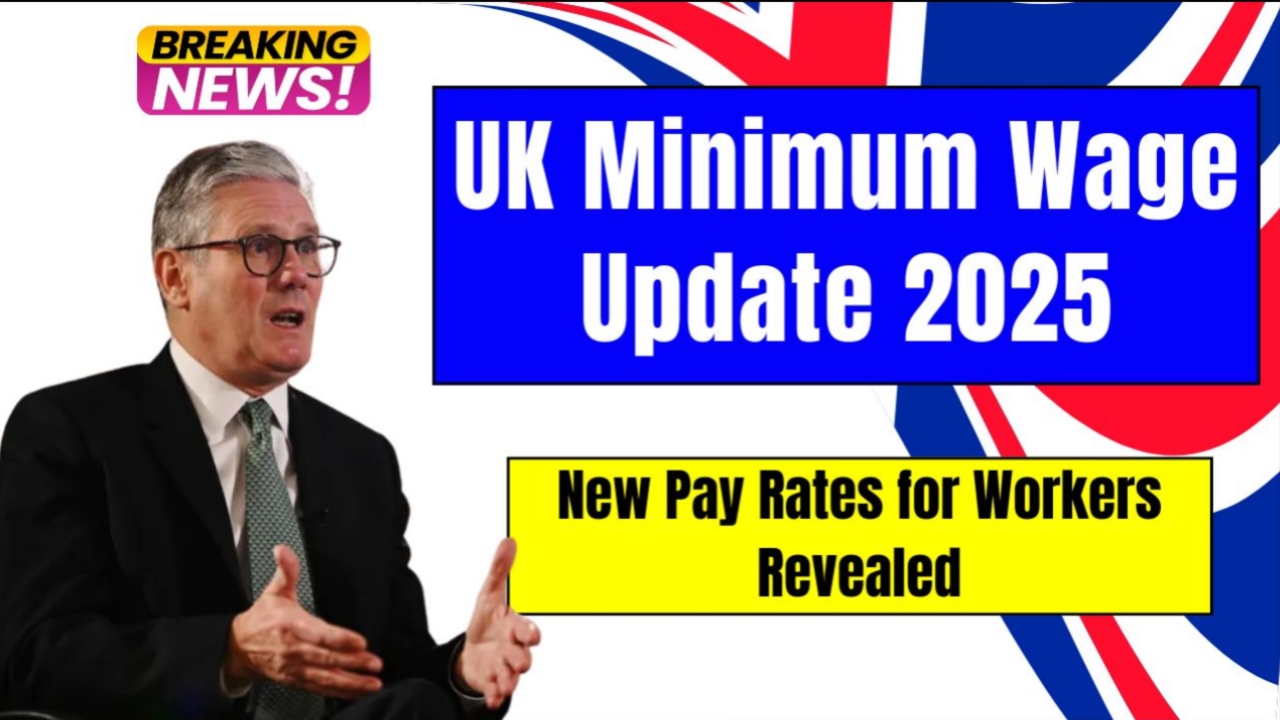UK Minimum Wage Update 2025, New Pay Rates Set to Benefit Millions of Workers
Starting April 1, 2025, the UK government will introduce revised rates for both the National Minimum Wage (NMW) and the National Living Wage (NLW). These updated wage rates are set to impact over 3 million workers across the country. This move is part of the government’s wider effort to support lower-income households struggling with the ongoing rise in inflation and the soaring cost of living.
This pay rise is more than just a financial adjustment—it’s a step toward narrowing wage gaps, enhancing financial stability, and ensuring a dignified standard of living for workers of all age groups.
What Is the National Living Wage?
The National Living Wage is applicable to employees aged 21 and over. From April 2025, this hourly rate will rise from £11.44 to £12.21. This change means that someone working 37.5 hours a week could see their yearly income grow from £22,918 to around £24,441. Employees in industries like retail, hospitality, and healthcare are expected to see the most direct impact. The increase also aligns with the government’s broader strategy to ensure workers receive at least two-thirds of the average national wage.
Updated Minimum Wage Rates by Age Group
The aim behind these changes is to promote fair pay not just for adult workers, but for younger employees and apprentices as well:
-
Ages 18 to 20: New rate is £10.00 per hour, up from £8.60 (a 16.3% increase)
-
Ages 16 to 17: Pay rises from £6.40 to £7.55 per hour (an 18% increase)
-
Apprentices: Their hourly wage will also go up from £6.40 to £7.55
These changes are designed to offer young people greater financial security while encouraging more participation in training programs and entry-level positions.
What Are the Benefits for Workers?
Higher Take-Home Pay: A 21-year-old full-time worker will now earn around £1,523 more per year—enough to better manage costs like rent, utilities, and everyday necessities.
Better Financial Resilience: At a time when inflation is putting pressure on every household, this increase offers much-needed relief and boosts financial confidence.
Boost to the Economy: With more disposable income, people are likely to spend more, which can stimulate economic growth and support local businesses.
What Should Employers Expect?
Businesses—especially in sectors such as retail, healthcare, and hospitality—will need to adjust their payroll systems and budgets to align with the new wage structure.
Key Areas to Focus On:
-
Rising Staffing Costs: The wage hike will raise the cost of employing staff, prompting many businesses to reconsider their pricing models and workforce plans.
-
Payroll & Contract Adjustments: Employers must update employee contracts and HR systems before April 2025 to reflect the new rates.
-
Training HR Teams: HR and finance departments need to be fully informed about the new rules to avoid errors or confusion in salary processing.
What If Employers Don’t Comply?
Financial Consequences: Businesses that fail to meet the new wage standards could face fines of up to £20,000 for each underpaid employee.
Reputation at Risk: Companies caught underpaying may suffer serious damage to their brand image and employee trust.
Employer Action Plan for April 2025:
-
Update payroll systems in advance
-
Notify employees about the upcoming changes
-
Review and amend all employment contracts as needed
Who Is Entitled to NMW and NLW?
To qualify for the National Minimum or Living Wage, a person must:
-
Be at least 16 years old
-
Be legally employed in the UK
-
Work as an employee (full-time, part-time, casual, or apprentice)
-
Be doing paid work (voluntary work and self-employed individuals do not qualify)
Conclusion
The 2025 wage update by the UK government marks a significant push toward fairer pay and improved living conditions. The updated pay structure is particularly beneficial for younger employees and apprentices, helping close the income gap. Now, it’s crucial for employers to adapt their systems in time, ensuring compliance while building a supportive, transparent work environment.
FAQs
Q1. What is the new National Living Wage from April 2025?
A: Starting April 1, 2025, the National Living Wage for workers aged 21 and older will be £12.21 per hour, up from the previous £11.44.
Q2. Who will benefit from these wage updates?
A: More than 3 million UK workers, especially in hospitality, retail, and healthcare sectors, are expected to gain from the increase.
Q3. Why is the UK government making these changes?
A: The update aims to improve pay equality, raise living standards, and ensure wages keep pace with the rising cost of living.
Q4. Are these wage changes applicable across all parts of the UK?
A: Yes, the updated rates will apply throughout the UK—including England, Scotland, Wales, and Northern Ireland.
Q5. What happens if a business doesn’t follow the new rules?
A: Non-compliant employers could be fined up to £20,000 per affected employee and may also face reputational and legal fallout.




